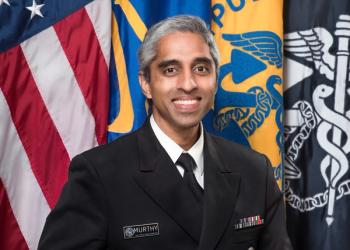
The new Advanced Research Project Agency for Health will be an independent entity within the National Institutes of Health. Advocates welcome the agency but don’t want its funding to come at the expense of the NIH.

The new Advanced Research Project Agency for Health will be an independent entity within the National Institutes of Health. Advocates welcome the agency but don’t want its funding to come at the expense of the NIH.

A new report from the watchdog organization details progress in some areas, but said hospitals are falling short in enabling parents to report problems.

The American Medical Association and other health groups aren’t just calling for healing. They are urging lawmakers to take concrete steps to protect Americans from gun violence.

Harvard researchers examined data from thousands of nurses. Those with depression or loneliness were significantly more likely to end up in the hospital.

Vivek Murthy said action is needed because the nation’s health is at risk. Healthcare worker shortages have spiked during the COVID-19 pandemic and are expected to worsen.

In an interview with Chief Healthcare Executive, Maples talks about the COVID-19 pandemic, the transformation of the campus in Newark, N.J., and revitalizing the workforce.

They are collaborating on an educational effort aimed at reducing disparities in patient care. Eight hospitals were selected for a year-long program.

Care New England Health's chief executive is stepping down and HCA Healthcare names a new president for its MidAmerica division.

Through the first four months of the year, the number of chief executive departures has risen substantially, according to a new report.

Healthcare groups feared government officials would announce that the emergency declaration would not be renewed.

New Hampshire’s attorney general opposed the deal. Shortly afterward, the two systems said they were abandoning the planned partnership.

The hospital pricing study found wide ranges in costs at different hospitals. The American Hospital Association said the report jumps to ‘unfounded conclusions.’

Health systems are delaying tests due to a shortage of contrast dye used in many imaging procedures. Hospitals may not see normal supplies until well into the summer.

One in four healthcare leaders surveyed said they need to hire at least 20 people in their billing departments, according to a poll commissioned by AKASA.

The healthcare systems aim to create a premier academic medical center. The deal still requires the approval of federal regulators.

Nurses say they are being assaulted by patients or family members with increasing frequency. A Senate bill would require health systems to enact workforce violence prevention plans.

Billions in federal aid kept many hospitals afloat, including smaller providers and rural hospitals, Johns Hopkins researchers found.

The planned union would create one of America’s largest nonprofit systems. Ken Kaufman of Kaufman Hall said he expects to see more partnerships.

Some hospitals say they expect to lose millions of dollars as large drugmakers are putting the brakes on discounts. Hospitals say the restrictions could hurt their ability to serve patients.


University Hospitals selects a president for three Ohio hospitals, University of Virginia Medical Center chooses a CEO, and other leaders fill new posts.

RaDonda Vaught received probation in a case that gained national attention. Many expressed relief she was spared a prison term, but experts warned her conviction could deter nurses from disclosing errors.

The American Hospital Association, American Medical Association, AARP and others argue the emergency declaration provides critical tools to fight the virus and protect the public.

President Joe Biden marked the grim milestone Thursday. More than 3,000 healthcare workers died in the first year of the pandemic, but the full toll isn’t clear.

Some nursing leaders say shorter, more flexible shifts would help the nursing shortage and also protect patients. But moving away from 12-hour shifts wouldn’t be easy.